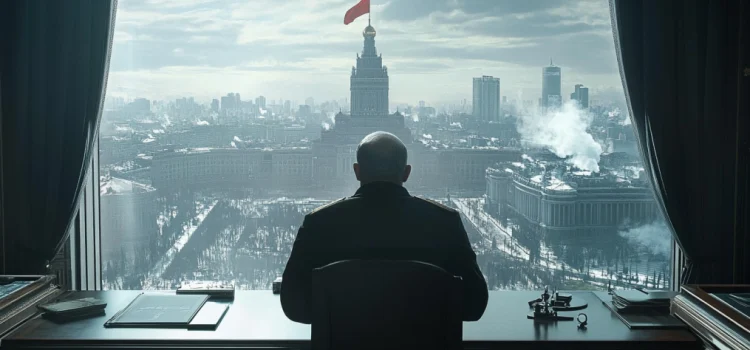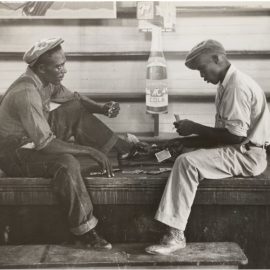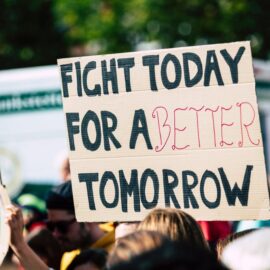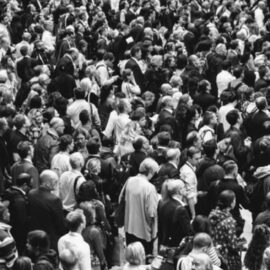

This article is an excerpt from the Shortform book guide to "The Dictator's Handbook" by Bruce Bueno de Mesquita and Alastair Smith. Shortform has the world's best summaries and analyses of books you should be reading.
Like this article? Sign up for a free trial here.
How do dictators stay in power? How do they keep the right people satisfied? How differently do democratic leaders behave?
In their book The Dictator’s Handbook, Bruce Bueno de Mesquita and Alastair Smith reveal the tactics dictators use to maintain control, comparing them with democratic practices. They explore three key methods: rewarding supporters, punishing dissenters, and managing revolutions.
Read more to understand how dictators and democrats maintain power after they seize it.
How Dictators Maintain Control
How do dictators stay in power? The authors answer this question, comparing and contrasting what both dictators and democrats do after they rise to power. Maintaining power requires ensuring continued loyalty from their power bloc—otherwise, they won’t be able to control the country and would risk being replaced. According to the authors, leaders use three main methods to ensure the loyalty of their power blocs:
- Reward support
- Punish dissent
- Pacify revolts
(Shortform note: Due to the way certain nations run their electoral systems, leaders occasionally gain control over their nations without having any loyal power bloc. But, in these cases, it’s debatable the extent to which the leader is actually in power—they might hold an office of leadership but fail to do anything with it. For example, US President Millard Fillmore took office in 1850 when his predecessor Zachary Taylor died suddenly. Despite having no real support from his party and not actually being elected, Fillmore was still president for three years—though he accomplished little in that time.)
Method #1: Reward Support
The most reliable way leaders maintain loyalty is by providing their power bloc with political and economic benefits. As long as a leader keeps “paying out,” their supporters will have little interest in turning on them. In addition, leaders often must provide some baseline level of public goods to their whole population to keep people productive and prevent outright revolt.
(Shortform note: By arguing that all leaders secure loyalty from supporters through rewards, the authors claim that all leaders are incentivized to use a spoils system—the practice of rewarding high-ranking government positions based on loyalty. Spoils systems contrast with merit-based systems where “rewards” like high-ranking government positions are given to the most capable rather than to the most loyal.)
The authors explain that dictators and democrats reward supporters and provide public goods in different ways:
How Dictators Reward Support
Dictators provide members of their small power blocs with high-ranking political positions and large amounts of money. The authors argue that dictators generate the money necessary for this through a combination of high taxes, loans from foreign nations and institutions, wealth generated from natural resource extraction, and corrupt deals with private companies.
For example, dictator Mobutu Sese Seko of the Democratic Republic of the Congo rewarded his loyal supporters by giving them control of state industries, directly bribing them, or permitting them to engage in corruption. He sustained this with international loans, cuts to salaries of low-level state employees, and profits from the sale of natural resources like copper.
(Shortform note: In some instances, the entire government of a dictatorship can revolve around the personal enrichment of a leader and their power bloc. This system of absolute corruption at the highest levels of government is known as kleptocracy. In a kleptocracy, public institutions, natural resources, and major industries are all designed to enrich high-level politicians. For example, kleptocrats might own the companies that harvest natural resources, the companies that use them to manufacture weapons, and the political posts to offer themselves lucrative military contracts for those weapons. Fully equipping the military is then secondary to enriching everyone along the way.)
How Democrats Reward Support
Democrats reward members of their large power blocs through one (or both) of the following ways:
- Buying votes: Some democrats bribe individuals for their votes, offering money, free meals, or other small rewards.
- Beneficial policies and projects: Most democrats reward their power blocs indirectly by passing policies and pursuing projects that benefit them. For example, a democrat might cut taxes for groups in their power bloc or improve the infrastructure of a region that supported them.
Democrats are more constrained than dictators when it comes to generating money for rewards because they’re responsible to far more supporters. This means they can’t tax as many people freely without losing support. In addition, their responsibility makes it more difficult for them to borrow money irresponsibly or engage in corruption, since the public bears the burden of excessive debt or misused taxed dollars. To work around these constraints, democrats place the tax burden on people outside of their power bloc and borrow as much as they reasonably can.
(Shortform note: Some scholars disagree with the authors, arguing that democratic nations tend to tax more than dictatorships. They suggest this is because citizens of democratic nations feel like they have a say in government and are therefore willing to pay more taxes. On the other hand, citizens of dictatorships have little say in how their government raises and spends money. Therefore, they’re less willing to pay taxes, and higher tax rates are more likely to cause unrest.)
How Dictators and Democrats Use Public Goods
In addition to specifically rewarding supporters, both dictators and democrats provide public goods—things like public education, nationalized health care, municipal water systems and so on—to keep their populations productive and pacified. Public goods like health care and education increase labor productivity, boosting economic activity and therefore providing a larger pool of wealth the government can tax. The improved quality of life from public goods also means that people outside of the power bloc will be less desperate and therefore less likely to revolt against the government.
The authors argue that, because of their larger power blocs, democrats tend to invest more in better public goods than dictators. Democrats are accountable to a larger portion of their populations because they have larger power blocs. Since public goods benefit the entire population, they offer democrats a better ratio (compared to dictators) of money spent on the power bloc to money spent on people outside of it. Therefore, they’re more willing to invest money into public goods.
| Covid-19 and Public Health Outcomes The Covid-19 pandemic tested the authors’ claim that democracies tend to have better public goods than dictatorships—as public health measures and infrastructure were a crucial factor in determining how countries managed the pandemic. And while research (and the disease) is ongoing, initial findings suggest democracies and dictatorships had relatively similar Covid-19 death rates during the first few months of the pandemic, while dictatorships had lower death rates later on. Some researchers argue this difference is due to dictators underreporting deaths and cases, while others believe the low accountability of dictators allowed them to more efficiently enact measures to contain the pandemic. Regardless, even when accounting for potentially manipulated case and death rates, democracies didn’t have significantly lower numbers of cases or deaths compared to dictatorships. This contrasts with the authors’ claim that democrats generally have superior public goods. |
Method #2: Punish Dissent
The authors explain that, in addition to rewarding supporters, leaders can maintain loyalty by punishing dissenters and political rivals. When supporters know that harsh punishment is the consequence of disloyalty, they’ll be less likely to step out of line. For dictators, punishments for individual dissenters can include death, imprisonment, firing, or demotion. Democrats, on the other hand, can use the legal system to try and disqualify opposing votes, intimidate or attack voters in areas that support their rivals, or limit and cut government services to those areas.
(Shortform note: Political parties are often more responsible for punishing dissent than individual leaders. This is part of a process of maintaining party discipline, or ensuring individual politicians follow the official party agenda. Party officials maintain party discipline by threatening to withdraw financial and political support to dissenting members. Even leaders themselves can be subject to party discipline if they rely on the support of their party to stay in power.)
Keep Supporters Replaceable
For punishments to be truly effective, leaders must make sure everyone in their power bloc is replaceable. If the leader relies too heavily on one supporter or one group of supporters, then those supporters will have much more leverage over them. The supporters can use this leverage to express dissent more freely, demand more rewards, or even to secure their own support and take over the country. But, if everyone in a power bloc is replaceable, the threat of punishment will be far more effective—the leader can easily arrest or fire individuals because there are plenty of loyal people willing to replace them.
(Shortform note: Critics of this theory argue that in many regimes, leaders are more replaceable than members of their power blocs. They note that key supporters of dictators often have sources of power independent from their leader—private wealth, experience and connections, and so on. This independent power makes them difficult to replace. On the other hand, these key supporters often maintain an important position in government even if their leader is replaced, offering their power to whomever comes next. This means that leaders might want to focus less on making their supporters replaceable and more on making themselves irreplaceable.)
Method #3: Pacify Revolutions
When leaders fail to use rewards and punishments correctly, or when circumstances outside of their control—a global economic crash, for example—cause unrest, the population at large can revolt against them. The authors assert that revolutions are dangerous times for leaders and require careful political management.
| What Counts as a Revolution? To better understand how revolutions arise and how leaders try to deal with them, it helps to clarify what a revolution is and is not. To this end, let’s look at scholarly definitions of “revolution” and a few other common terms for anti-government violence: A revolution is a popular movement to replace part or all of a country’s government. Revolutions tend to have a specific ideology behind them. For example, the 1960 April Revolution in South Korea was a massive wave of prodemocracy and anti-police brutality protests that forced then President Rhee Syngman to resign. A coup d’état or coup is when a small group of political or military elites use violence to replace or seize control of the government. Coups do not involve a large portion of a country’s population. For example, in 1980 the senior command of Turkey’s military arrested key members of the country’s civilian government and replaced its constitution. A rebellion or insurrection is any kind of popular violent resistance to the government regardless of goal, ideology, or lack thereof. Rebellions don’t always attempt to replace the government. For example, during the West Virginia Coal Wars, miners battled with state and local police for better working conditions and the right to strike. |
Why Revolutions Happen
To understand how leaders manage revolutions, it helps to first understand why they occur. The authors argue revolutions happen most often in countries with medium-sized power blocs—dictators who allow some popular political participation, or democrats who partially limit or bypass it. Such leaders need both some popular support and some support from higher level military or bureaucratic figures to stay in power.
In these regimes, supporters are incentivized to shrink or expand the power bloc: If they shrink it, remaining supporters will get a larger share of rewards. If they expand it, they’ll benefit from increased public goods (and the revenue, productivity, and quality of life associated with those public goods). Medium-sized power blocs also make it harder for leaders to get away with harsh repressive tactics, since they have some degree of accountability to their population. This means their power bloc is more likely to respond to repression by pulling support or replacing their leader.
(Shortform note: In addition to domestic politics—in this case, the size and stability of a leader’s power bloc—international politics can also contribute to revolutions. Popular movements are often indirectly or directly supported by foreign governments with a vested interest in changing that country’s regime. For example, the Soviet Union and Communist China supported various factions of revolutionaries during the Rhodesian Bush War in modern-day Zimbabwe, hoping to install a friendly regime and increase their influence in the region.)
How Leaders Manage Revolutions
The authors explain that because medium-sized power blocs are more susceptible to revolts, their leaders respond to popular revolutions by either shrinking or growing their power blocs in whatever way keeps them in power. If they have the necessary manpower to control the population, they can shrink their power bloc by brutally repressing the revolt. If they don’t have the manpower, they can appease the revolutionaries through liberalizing political reforms—increasing the size of their power blocs.
For example, the Soviet Union responded to the Hungarian Revolution of 1956 by shrinking its power bloc. The leadership killed and arrested thousands of protesters, replaced the Hungarian government with one far more loyal to Soviet interests, and permanently kept troops in the country. On the other hand, Beninese dictator Mathieu Kérékou responded to growing unrest by transitioning Benin into a larger power bloc multiparty democracy in the late 80s, and—after briefly being ousted from power—was elected president in 1996.
(Shortform note: Some scholars suggest that leaders often don’t have time to respond to revolutions—instead, they tend to occur suddenly and without warning. These scholars explain that the many social divisions leading to revolution are often only visible in hindsight, and that leaders often fail to anticipate when protest movements or acts of rebellion will lead to all-out revolution. This means many regimes never get the opportunity to shrink or grow their power blocs before they’re replaced.)

———End of Preview———
Like what you just read? Read the rest of the world's best book summary and analysis of Bruce Bueno de Mesquita and Alastair Smith's "The Dictator's Handbook" at Shortform.
Here's what you'll find in our full The Dictator's Handbook summary:
- The two factors that truly distinguish one political system from another
- How leaders seize and stay in power in democracies and dictatorships
- The specific reason why democracy is better than dictatorship






